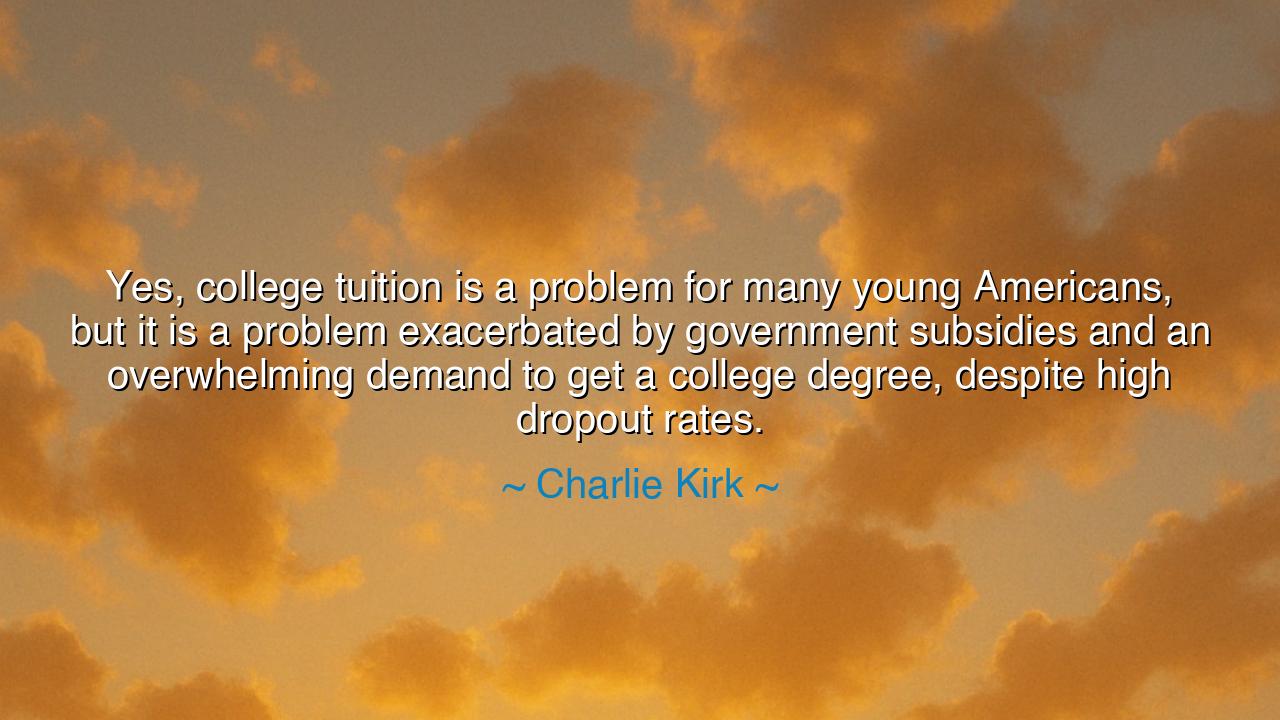
Yes, college tuition is a problem for many young Americans, but
Yes, college tuition is a problem for many young Americans, but it is a problem exacerbated by government subsidies and an overwhelming demand to get a college degree, despite high dropout rates.






"Yes, college tuition is a problem for many young Americans, but it is a problem exacerbated by government subsidies and an overwhelming demand to get a college degree, despite high dropout rates." Thus spoke Charlie Kirk, a voice of the modern age, reflecting on one of the great paradoxes of our time — that in the pursuit of knowledge, society has chained its youth to debt and illusion. His words, though rooted in the present, echo with ancient truth: that when the quest for wisdom is corrupted by pride, and when learning becomes an idol rather than a path, both the mind and the nation suffer. Kirk’s statement is not a rejection of education, but a rebuke of excess — a call to restore purpose, honesty, and balance in the way we seek learning and opportunity.
In this saying, college tuition becomes more than a financial burden; it is a symbol of a deeper disorder. Once, the pursuit of higher learning was a sacred calling — the philosopher under the olive tree, the monk by candlelight, the craftsman perfecting his art. But in our age, education has been consumed by demand, by the idea that every person must tread the same path, whether or not it leads to truth. The government, seeking to make this dream universal, pours forth subsidies in abundance, believing that more access means more enlightenment. Yet these well-meaning acts, as Kirk observes, have sown new troubles: inflated costs, false promises, and countless souls burdened by debt before their lives have even begun.
The origin of this problem lies in the human heart — in our desire for status rather than understanding. As nations grew wealthy, the simple virtue of learning was replaced by the pride of credentials. Parents, teachers, and politicians alike came to worship the degree, not the wisdom it was meant to symbolize. The state, joining in this devotion, offered loans and subsidies so that all might partake in the ritual. But in doing so, it removed the natural discipline of cost and choice. When something precious becomes too easy to claim, its value fades. Thus, the more the government poured gold into the halls of universities, the higher the price of admission became, until the pursuit of knowledge became a burden rather than a blessing.
History offers warning enough. In ancient Rome, education too became a mark of prestige rather than substance. Wealthy families sent their sons to rhetoricians to learn not truth, but the art of persuasion — to win favor in court and politics, not to serve the public good. The empire was filled with men skilled in speech but empty in virtue. Meanwhile, craftsmen, soldiers, and farmers — the true builders of Rome — were looked down upon as lesser. Thus, when the empire’s wealth collapsed, its people found themselves rich in rhetoric but poor in wisdom. So too in our age, Kirk warns, the overwhelming demand for college degrees risks creating a generation that measures intelligence by certificates and neglects the strength of skill, trade, and character.
And what of the high dropout rates he mentions? These are not signs of failure in the students alone, but of a system that invites too many who are unprepared, and promises too much without truth. When education becomes an expectation rather than a calling, countless young people enter its gates without direction, only to leave disillusioned and indebted. It is not wisdom they find, but confusion; not freedom, but obligation. Here, Kirk’s insight pierces deeply: the problem is not just cost, but culture. We have taught generations to believe that worth is found in the diploma, not in discipline — in prestige, not in purpose.
The meaning of Kirk’s words, then, is a call to reawaken the ancient virtue of discernment. Education must again become a sacred trust, not a market of vanity. Government should encourage learning, but not distort it; it should protect opportunity, but not inflate illusion. True knowledge, as the ancients taught, is not found in grand halls or costly books, but in the humble mind that hungers for truth. When education is guided by purpose and not by pride, when it serves life rather than status, it once again becomes the light of civilization rather than the burden of its youth.
The lesson, therefore, is this: seek wisdom, not merely degrees. Measure your education not by how much it costs, but by how deeply it transforms your soul. Let government be a servant of learning, not its master, and let society honor all who labor with skill and integrity — whether they bear a scholar’s title or the mark of a craftsman’s hand. For the true wealth of a nation lies not in the number of its graduates, but in the virtue and intelligence of its people, each fulfilling their calling with excellence.
So remember the wisdom of Charlie Kirk: when knowledge becomes a market and education a mandate, both lose their soul. Let us restore balance — let us build a culture where learning is pursued with purpose, where government empowers without corrupting, and where every young person is free not just to study, but to live wisely. For when education returns to its true nature — the pursuit of truth — then both the mind and the nation will be set free once more.






AAdministratorAdministrator
Welcome, honored guests. Please leave a comment, we will respond soon